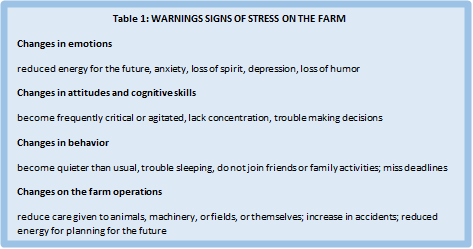By Elizabeth Sipple, VT Agency of Agriculture, Food & Markets
In a recent training with Karen Crowley and Leanne Porter from Farm First, Agency staff explored techniques for supporting farmers when feeling stressed. The goal of the training was to support agricultural service providers in recognizing signs of stress and connect farmers with support long before things escalate to a crisis point. Farm First will be offering a similar training available to all agricultural service providers beginning in the fall of 2022. Don't hesitate to contact Farm First (farmfirst.org) for more information.
The first question that Farm First asked at the training, was: "If not you, who?" Farming can be an isolating profession, so anyone who visits farmers should have a baseline understanding of what types of stress are typical and when it is time to suggest that a farmer get additional support. Farm First says that the first step is to be able to recognize when a farmer is agitated, anxious, or stressed. Table 1 below presents some warning signs that a service provider might notice.

But how do you even broach a topic that may feel awkward and sensitive? If you are concerned about someone's wellbeing, below are some ways to begin a conversation:
- Express concern: "What you just said is concerning to me."
- Inquire about a behavior change: "I have not seen you at church (the diner, coop meeting, feed store, etc.) recently, is everything alright?"
- Ask for more information: "What did you mean when you said that?"
- Invite them to talk more: "What is going on? Do you want to talk about it?"
- Ask directly: "Are you really in trouble here?"
Once someone opens up to you, Farm First says it is critical to respond without judgment or criticism and with words of reassurance and support. Farm First also reminds us to avoid the impulse to jump to solutions or any statement that treats the situation as simple. These sentences often use the word "just," as in "Well, you just need to grow hemp," or "This is just a bad time right now, but it will all work out."
Below are examples of sentiments that can be expressed:
- Recognize the difficulty of the situation: "It sounds like you are dealing with some really tough stuff."
- Support their decision to reach out: "I am glad you told me. I'm sure that was not easy to do."
- Identifying potential sources of support: "Let's sit down and think about who might be able to help in figuring this out, Farm First is always available to talk.”
- Offer hope: "I am sure we can find the best way through all of this."
Neighbors and agricultural service providers can support farmers by building relationships, listening, and sharing resources. In some cases, you may decide to take the extra step and help a farmer connect to Farm First. Farm First is a Vermont-based program that provides farmers and their families with FREE support. You can reach Farm First at:
Call: (802) 318-5538 during daytime work hours
Call: 877-493-6216 outside of daytime work hours
Email: Karen Crowley at karenc@farmfirst.org or Matt.Myers@farmfirst.org
Every conversation about stress combats stigma, so let's get talking!!!

